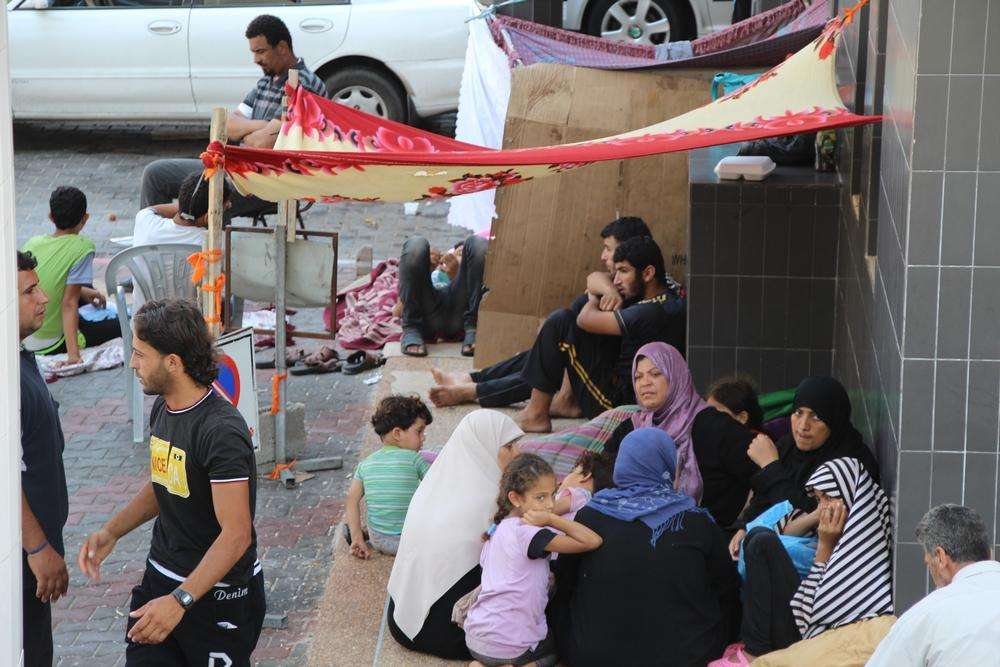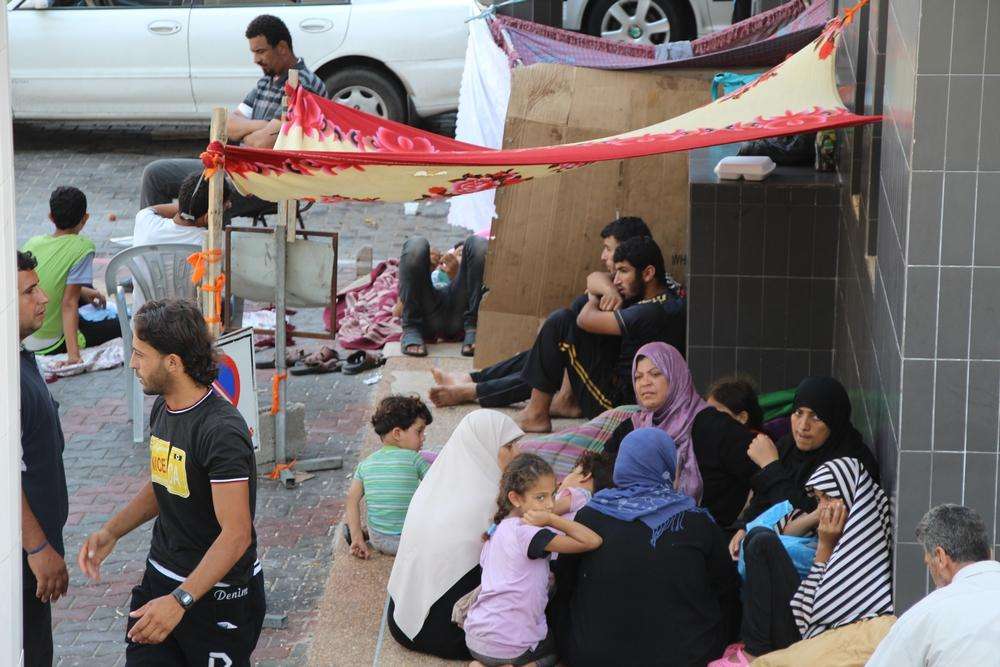Around Shifa hospital, in the United Nations Relief and Works Agency (UNRWA) schools, in neighboring homes, or with family members, the number of people displaced by the bombing is now over 150,000. That is almost one person in ten. The Palestinian staff of Doctors Without Borders/Médecins Sans Frontières (MSF) is not spared.
The families of two MSF employees have taken refuge inside the grounds of the MSF clinic. Twenty or so people are living there, mostly women and children, including one pregnant woman and a young mother who has just given birth. They come from Beit Layiah and say it is impossible to go back. Laundry is hanging behind the clinic; children come out timidly.
“Three rooms have been set aside so that they can have some minimum level of privacy. I brought a few toys, but they do not dare let their children play outside much when the clinic is open for patients,” explains Raewyn, MSF nurse.
At night the team returns to the MSF office to break the fast with their Palestinian colleagues, as it is Ramadan. “Here I feel safe,” confides one of those who has chosen to stay at the MSF office. Another had to evacuate his home in the Tuffah neighborhood, which was under threat from tanks operating in the north-east of Gaza. He has already lost four members of his family, including two women. Another is hosting the family of his cousin. They are 40 people sharing three rooms. A third retells how his neighbors’ building was bombed the previous day, killing five people. There are now ten families living in his building, meaning 100 people across four apartments.
“It is impossible to get exact numbers of people displaced by the bombings, but including all those who are sheltering with family and neighbors, it is certainly more than 200,000,” estimates Nicolas Palarus, project coordinator for MSF’s Gaza project.
The United Nations states that there are already 2,000 people taking refuge around Gaza’s Al Shifa hospital, seeking some modicum of protection. The families began arriving Monday, July 21, from the bombed Shuja’iyeh neighborhood, and since then more have progressively joined them. Having first set themselves up on the ground, day by day they fashion some sort of shelter using what they can find or materials they are given: mats, sheets, and branches. In external corridors, in the park behind the hospital, everywhere there are mostly women and children who play, running around with plastic bags transformed into balloons. There a man whose face is marked by fatigue sits next to his baby, who is wrapped in a blanket. Over here a women sits in a plastic chair under a tree, taking advantage of the little shade it offers. Several local associations have mobilized to set up distributions of food, and volunteers circulate during the day to add the families to their lists and provide some necessary provisions. An employee in Shifa wanders around the makeshift shelters with trash bags as part of the hospital’s effort to manage garbage.
UN agencies estimate more than 140,000 people are now staying in UN schools, which are serving as refuges. Those schools are overwhelmed, with 80 people to a classroom. The hygiene conditions are delicate due to overcrowding and the lack of water. Faced with this overcrowding, the authorities have made public schools, mosques, and churches available too; they have also sent the coordinates of these places to the Israeli military, but many still do not want to leave their homes.
“I do not want to go to a UNRWA school; the conditions there are too bad. I want to stay at home. There are 54 of us in my building. If we leave, Israel might bomb our building, but if we stay they will not,” says a volunteer the nurse met at Shifa hospital. The volunteer lives in the Beit Layiah neighborhood, which has been severely hit since the beginning of the conflict. With the bombing of the Beit Hanoun school on Thursday, July 24, families are likely to be even more reluctant to go to shelters where the international presence still offers no greater security guarantee.
With overcrowding, lack of water, electricity shortages, and difficulties with food supply due to bombing from the air, land, and sea, the health situation is critical in the entire Gaza Strip. Saturday, there is a ceasefire, the streets of Gaza City suddenly grow animated, and the number of dead pulled from the rubble grows throughout the day. But at 8 p.m. the window closes, and the MSF team, along with the Palestinians, prepares to spend another night of Ramadan in besieged Gaza.





